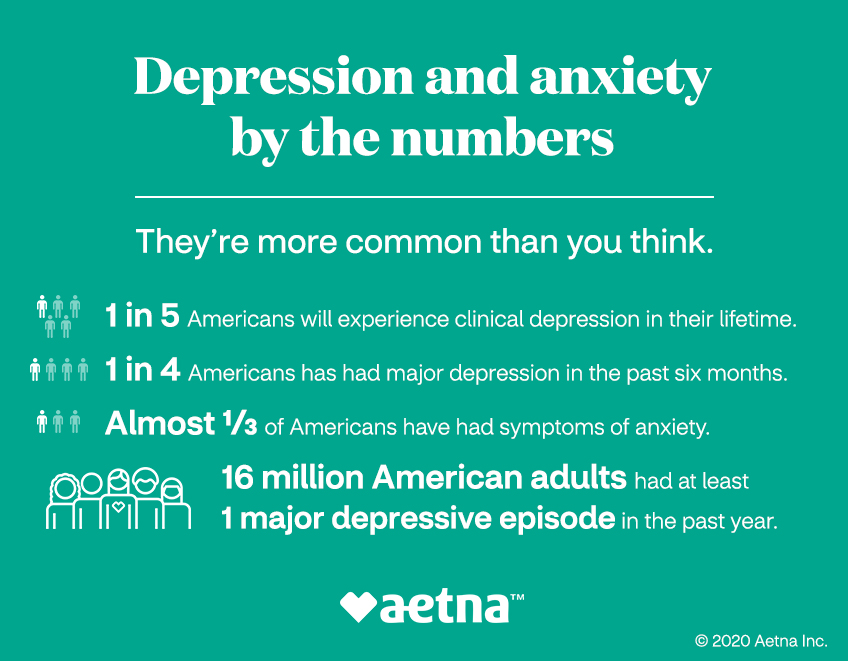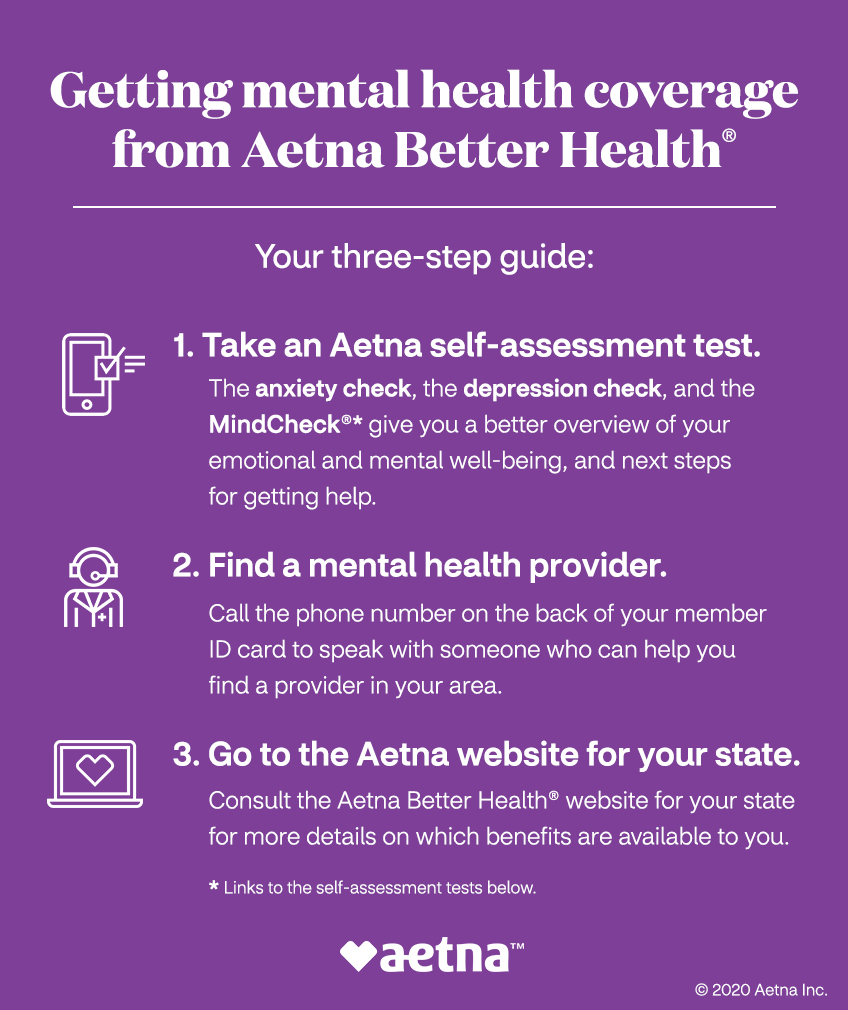Links to various Aetna Better Health and non-Aetna Better Health sites are provided for your convenience. Aetna Better Health is not responsible or liable for non-Aetna Better Health content accuracy or privacy practices of linked sites or for products or services described on these sites.
Staying mentally healthy in tough times
 By Eric Spitznagel
By Eric Spitznagel

Depression and anxiety by the numbers
They’re more common than you think.
1 in 5 Americans will experience clinical depression in their lifetime.
1 in 4 Americans has had major depression in the past six months.
Almost 1/3 of Americans have had symptoms of anxiety.
16 million American adults had at least 1 major depressive episode in the past year.
© 2020 Aetna Inc.
It’s difficult to admit you might be suffering from depression, anxiety, or other mental health challenges. “There’s so much stigma in this country around mental illness,” says Murali Rao, MD, a psychiatrist from Chicago. “It’s regarded as a weakness, when nothing could be further from the truth.”
Fewer than half of all people who suffer from mental health issues ever seek help. Those who do get help wait an average of six to eight years to do so.
One of the main reasons people wait is confusion. “If you get chest pains, you know where to go and what to do,” says Rao. “You know to call 911 or go to the nearest emergency room. But what about if you feel sad? They look happy and healthy on the outside, but inside they’re feeling torn apart. It’s not clear where to go or who to call, and that lack of information keeps most people silent.”
Getting on the path to better health isn’t as difficult as you might think. Here are some simple steps to help you access the mental health support available to Aetna Better Health® Medicaid members.

Getting mental health coverage from Aetna Better Health®
Your three-step guide:
1. Take an Aetna self-assessment test.
The anxiety check, the depression check, and the MindCheck®* give you a better overview of your emotional and mental well-being, and next steps for getting help.
2. Find a mental health provider.
Call the phone number on the back of your member ID card to speak with someone who can help you find a provider in your area.
3. Go to the Aetna website for your state.
Consult the Aetna Better Health® website for your state for more details on which benefits are available to you.
*Links to the self-assessment tests below.
© 2020 Aetna Inc.
Self-assess: Do I need treatment?
While the best way to start is by talking about your symptoms with a doctor, not everyone is comfortable taking that first step, especially due to COVID-19.
Aetna is here to help. Without leaving your home, you can use our online self-assessment tools to do a mental checkup. By answering a few easy questions about how you’re feeling, you can get a better idea of your mental health.
Anxiety check: Seven questions to help you get a better understanding of your feelings, and tips on what to do next.
Depression check: 10 questions to help determine if you might be suffering from depression.
MindCheck®: An online tool that uses color coding to give you a better understanding of your emotional well-being.
Helping a friend or loved one in need
Learning how to recognize the symptoms of mental health distress could mean the difference between a loved one’s seeking help and continuing to ignore the problem. But you can’t diagnose a problem using only your instinct. Aetna has an online guide to help you see warning signs.
“Think of it like CPR,” says Dr. Rao. “Everybody should learn how to recognize somebody in a crisis, and what to do until help arrives.”
The benefits of counseling and therapy
Therapy isn’t just about lying on a couch and talking about your feelings. It’s about working with a therapist to find your mental health issues.
A few different types of therapy are available to Aetna Better Health members. Talk therapy has been proven to help deal with things like pain management and negative thoughts and emotions, without medications.
There are many different therapy and counseling options available with Aetna Better Health, which can be the first step in a journey towards a happier and more mentally healthy you.
What is a behavioral health care manager (and when do you need one)?
It isn’t always possible to make an appointment with a psychiatrist. That’s where a behavioral health care manager comes in.
It works like this: You raise concerns about your mental health with your primary care provider. He or she then brings these issues to a behavioral health care manager, who can help in the meantime.
“Sometimes a doctor will notice something that a patient says in passing about their feelings of gloominess, and they’ll reach out to an Aetna care manager, either virtually or by phone, to get input on treatment options. A psychiatrist won’t need to directly see the patient.”
Most medications are prescribed by doctors. But before this happens, the care manager consults with a psychiatrist to make sure those medications are indeed necessary. A care manager is available in every primary care center and is covered on Aetna Medicaid plans.
Unexpected ways to get (and stay) well
Believe it or not, taking care of your mental health can be fun. There are alternative forms of treatment that don’t involve doctors and hospitals. They include things like art therapy, pet therapy and even massage therapy.
The American Addiction Centers have backed music therapy, since it can “help to elevate mood, develop more positive outlooks and bring relaxation.” As for pet therapy, some studies have shown that just 20 minutes with a therapy dog can result in a significant drop in stress hormones and a big increase in the ones that promote health.
Consult the Aetna Better Health website for your state to find out which alternative therapy services are available to you.
Your emotions deserve the same care and attention as your body. Let Aetna Better Health help you get back on the path to a mentally healthy future.
About the author
Eric Spitznagel is a frequent contributor to Vanity Fair, Billboard, Men's Health, Playboy, The New York Post, and the New York Times Magazine, among others. He's published eight books, including his latest "Old Records Never Die: One Man's Quest for His Vinyl and His Past." He lives in Chicago with his wife and an 8-year-old amateur scientist.
Not yet a member?
See if Aetna Better Health® Medicaid coverage is available in your state.
See if Aetna Better Health® Medicaid coverage is available in your state.

